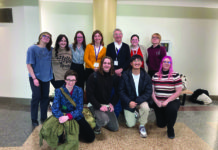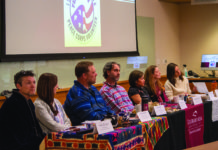The capacity to be, “comfortable to be uncomfortable” is how Kevin Kahuena characterizes his fall 2016 semester abroad spent in Tokyo, Japan. Having arrived without any fluency in Japanese, Kahuena was detained in the Tokyo airport until midnight due to his lack of a visa.
Though having underwent almost any student’s worst nightmare upon entering a foreign country, Kahuena highly recommends studying abroad to any student. Hailing from Hawaii, attending college in Colorado was the second time he had ever left his home state, and studying in Japan was the first time Kahuena had ever left the United States.
“When I first got there, it was a culture shock, you come to CMU and 75 percent of the population is Caucasian and I’m Polynesian so it was very different,” Kahuena said.
Being the third choice on his list of destinations, Kahuena expressed the isolation induced by a language barrier within his first month. However, he acknowledged that this could’ve been combatted had he armed himself with some basic dialogue before embarking.
“Google translator was my world,” Kahuena said.
Having many responsibilities here at CMU coinciding with being a resident assistant, Kahuena had much more freedom to allocate his time how he pleased while overseas.
“I had my first class at nine, before which I would usually grab breakfast and a beer,” Kahuena said. “I would [then] catch the train anywhere.”
Touching upon the interest of many prospective exchange students, much of his traveling to new cities occurred every day after his classes concluded, typically by himself.
“I got lost, probably, every single day, but I eventually learned, by month three,” Kahuena said.
Regarding the difference between American and Japanese culture, Kahuena expresses the innate honesty and purity the Japanese people authenticate in actions to assist others or rebuke acts of theft. Aside from his admiration for the people, Kahuena also developed a love of their food.
“Whenever I have Japanese food, it’s like home for me,” Kahuena said.
As far as our cultural reach in Japan, he explained the universal love Japanese people hold for Americans. “American music is really big for them – they know the words to the songs but they won’t know what they mean,” Kahuena said.
When asked if he could do anything differently? “I would have traveled more and not let financial burden stop me from doing so.” Kahuena also explains that in hindsight, opportunities for such extreme experiences and diverse friendships are few and there is a dire necessity to take full advantage of both when one is able.
Regarding the greatest lesson his study abroad experience gave him, “you will learn so much more than you would think you would learn. Leaving, I had no idea the things I would learn and how much rich, prominent culture I would be exposed to. Today, when we’re going through these immigration policies, I don’t think people who have not been able to travel and see through the other perspective of things have the best opinions on how to handle these situations. It’s something you have to be able to experience from the other side of the wall in order to truly make the best judgements, possible. Pun intended.”





